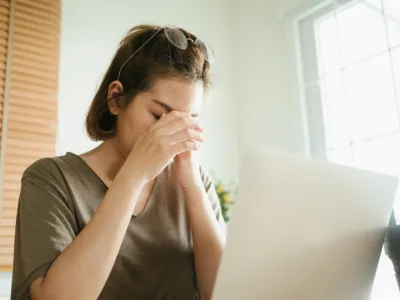Stories from energy consumers struggling during COVID-19

Published November 9, 2020
Think of all the things in your home that run on electricity: Your fridge, stove, oven, washing machine, dryer, coffee maker, microwave, water heater, private water well, furnace fan, your heat, fans, air conditioning, internet service, cell phone charger, TV, gaming systems, computer, printer, lights, and more.
Now, think about what happens when you can’t power any of it. Spoiled food, no warm food, dirty clothes piling up, no hot water, maybe no water, no heat or too much heat, no phone service, no entertainment or news, no distance learning, no remote work, and no lights.
Many people, probably including yourself, have experienced a temporary power outage of some sort because of a system outage or a weather event. We know this isn’t easy. But having your power shut off because you can’t pay the bill is a different type of anxiety.
Having your utility service shut off can set in motion a vicious cycle of late fees and deposits to be paid or repaid. It becomes really hard to catch up and can follow a family for years. If someone is struggling to keep up with existing bills, it's unlikely they have extra funds to pay late fees that can add up quickly. Additionally, customers who have been previously disconnected or do not have good credit are often required to put down a deposit to resume service. (This is also the case when they move and start service with a new utility.) It’s not uncommon for a utility to require a $200 deposit. Fronting this money creates further strain on a tight household budget.
While most utilities suspended shutoffs when COVID-19 first hit this spring, dozens of cooperative and municipal utilities have now resumed shutoffs, and people across Minnesota are being disconnected when they can’t pay their energy bills. Many other people are getting behind on their bills and are worried about getting shut off at a later date. We’ve heard from families with young kids about their electricity being shut off and are concerned about their food spoiling. Others come to us because of unforeseen medical costs, or even because they have been unable to work after contracting COVID-19 themselves. Some have felt pressured to enter into unreasonable payment plans that they are not able to follow through on.
We wanted to share some of the things we are hearing to bring awareness to struggles across our state during this challenging time. As you read the information below, recognize that many of the people reaching out to us want to be economically independent and financially stable. They are not trying to discharge their responsibility. They often just need some more time and flexibility to pay their bills. To protect the privacy of these consumers, we’re not sharing any specific stories, and instead are summarizing the themes we are hearing.
People who were struggling before face new challenges
Unfortunately, many Minnesotans frequently struggle to keep up with bills. This is not new. However, the consequences of not having electricity are direr during the pandemic. Losing service can mean not being able to wash, prepare food, and stay physically comfortable and socially distanced at home. Additionally, children’s education is at risk if they can’t log in to school when it’s held remotely.
Reporting by the state’s regulated utilities shows that people who were behind on their bills prior to COVID-19 are falling even farther behind. After COVID-19, the large arrears that may be building up will be difficult to address even when the household's economic situation returns to “normal” if there wasn’t much if any, extra money in “normal times.” Fortunately, many of these households are eligible for assistance.
Struggling to pay energy bills is a new concern for some
Many of the people we’ve talked to express that they haven’t struggled like this before, and they don’t know where to get help. Their incomes may have dropped suddenly. COVID-19 has affected people in different ways. Because of the economic impact of COVID-19, they may have had to take a pay cut or had their hours reduced, or are completely unemployed. Some people may have had COVID-19 themselves or have other unlying health concerns that make it risky for them to return to work. Many of these households likely would not have qualified for income-based assistance pre-pandemic but do now. We spend time making sure they are aware of programs that can help them. Energy Assistance is a long-standing federal program to help income-qualified households pay for heating and electricity bills, and the COVID-19 Housing Assistance Program is available for households at higher income levels.
Households are squeezed in the middle
These are households that are trying to adjust to reduced income but still make too much money to qualify for income-based programs, for instance, if one person in a household is still working, but others are not or are but at a reduced income. These households, like the ones above, will need to make tough decisions about what expenses can be reduced and what bills go unpaid. These households, especially because they may not be eligible for financial assistance, need flexibility and time to catch up. They need reasonable payment plans so it doesn’t become overwhelming to catch up.
We are continually monitoring trends, advocating for consumer protections at the legal level, and working collaboratively with utilities to prevent people from having their service shut off. With winter heating bills on the horizon, we expect to be hearing from more and more people.
If you or someone you know is struggling to keep up with your bills, please reach out and we will identify as many resources as we can to help. You can contact me at 651-300-4701, ext. 2 or carmenc@cubminnesota.org.